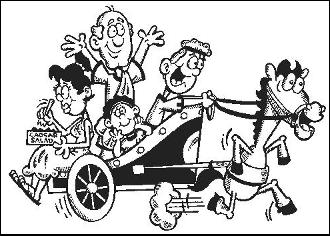The Complete Idiot's Guide to the Roman Empire (51 page)
Read The Complete Idiot's Guide to the Roman Empire Online
Authors: Eric Nelson

“Stop! Stop!” I hear you saying, “I can't keep it all straight!
I
want to destroy the west!” Well, hang in thereâit's almost over. We're perilously close to 476, the year of Rome's fall (according to Gibbon, remember). The western Empire is spinning out of control and spiraling into the beginnings of the Middle Ages. Before we proceed, however, think back to the different theories we looked at in Chapter 2, “Rome FAQ: Hot Topics in Brief,” regarding why Rome fell. Well, does the impending fall sound like a problem of lead pipes to you? Global warming? Simple economics? No, many things came together to destabilize, demoralize, and decentralize the Empire, and led to the loss of the West.
Rimicer (455â472)
Â
Roamin' the Romans
The Visigoths under Athaulf established Tolosa, modern Tolouse, as a great capital. It was there that the Visigoths elevated Avitus to emperor in 455, the first emperor elected outside of Rome.
After the death of Maximus in 455, it was all barbarians in the west. The Visigoths, under Theodoric II, elected one of their own, Avitus, as emperor in the West. Avitus appointed Rimicer, half Visigoth and Sueve, to the powerful position of
Master of the Foot Soldiers
. Rimicer turned on Avitus, deposed him, and manipulated a series of western emperors for the next 16 years. During this time, the western Roman emperor's (whoever he was) sphere of influence shrunk to include only Italy (caught between eastern emperor to the east), the Visigoth kingdoms to the north, and Gaiseric (the Vandal king of north Africa) to the south.
When Rimicer died in 472, two factions, one backed by the barbarians under a certain Orestes, one backed originally by the eastern emperor Leo II (who died in 474), fought for control. The barbarians got the upper hand and forced Nepos, Leo's choice, into exile in Diocletian's palace. While the eastern emperor Zeno struggled to maintain his hold on the eastern throne, the barbarians crowned the 16-year-old Romulus Augustulus, Orestes' son, western Emperor at Ravenna.
Orestes had procured the Germanic mercenaries' support for his control of the west by promising them land to settle on, just as other barbarians had been allowed to do elsewhere in the Empire. Orestes, however, tried to keep Italy intact. When the barbarians who had supported Orestes didn't get what they thought they had coming to
them, their chieftain, Odoacer, gave Orestes what they thought he had coming to him: a chop with a sword.
With Orestes dead, Romulus Augustulus was deposed and sent off to Naples with an allowance. Odoacer settled his people on a portion of Roman lands and was recognized as patrician of the west by the eastern emperor Zeno. This is where historian Edward Gibbon drew the line and proclaimed the Empire fallen, since the (albeit fuzzy) line of emperors from Augustus to Romulus was permanently severed. The last western Roman emperor was a 16-year-old usurper who had made it to emperor and early retirement. Even the dot.com generation would find that hard to match.
Zeno was worried about Odoacer's plans and plagued by a major uprising of Ostrogoths who were pillaging the lower Danube regions clear to the gates of the city. Their king was Theodoric the Amal, who had been a hostage as a young man in Constantinople while his father was king. Zeno hit upon a way to both get rid of Odoacer
and
give Theodoric something more productive to do. He sent Theodoric into Italy as his representative to conquer Odoacer. Theodoric invaded Italy in 489 and had mopped up Italy, including Odoacer, by 493. He became the eastern emperor's representative and the virtual king of Italy.
Rome, in the west, was no more. A patchwork of independent kingdoms emerged, built upon the ruins of Rome's imperial legacy, and moved into the darkness of the early Middle Ages. The Roman past continued to echo in some institutions (especially the church), laws, and learning. Rome's imperial idea, however, continued to haunt the dreams of the west into the modern age.
Â
When in Rome
Constantine the Great replaced the Praetorian Prefect (the commander of the Praeteorian Guard) with two posts, the
Master of the Foot Soldiers
(
Magister Peditum
) and the
Master of the Cavalry
(
Magister Equitum
). Only the supreme commander, the
Master of the Soldiers
(
Magister Militum
), had a higher command.
The Least You Need to Know
Â
Veto!
As you can see, it's simplistic to talk about the “fall” of either Rome or the Roman Empire. Just what fell, when, and to whom, gets pretty complicated. The western empire “fell apart” more than “fell,” making it hard to mark a definitive end.
- Constantine's sons split the Empire and fought for control of it.
- Disputes in Christian doctrine (such as Arianism) and the suppression of paganism became important forces in imperial history and politics.
- The Theodosians ruled over an empire mostly divided between boy emperors in which powerful regents and military commanders held sway.
- Huge barbarian invasions and migrations overwhelmed the western Empire in the fourth and fifth centuries.
- The settlement of independent barbarian kingdoms within the Empire and the reliance on barbarians for imperial defense and civil conflict, contributed significantly to the destabilization and loss of the west.
- The western Empire did not “fall”; it was transformed even as it “fell apart.”
Roman Imperial Life and Culture
Imperial Rome affected cultures from India to Ireland and Sudan to Sweden. These effects go a lot deeper than the scattered ruins that litter the landscape of Asia Minor, Europe, and North Africa. The broad scope of Rome's influence not only impacted cultures individually, but drew from, mixed, and united them in ways that still profoundly influence the world.
In the next chapters, we'll take a look at three aspects of McRoman culture with enduring legacies: its approach to religions, its literary legacy, and its public entertainment. In all three of these areas, the transformation of the Empire from pagan to predominantly Christian was a process of synthesis, as much as it was of conversion.

 Â
 Roman Mass Culture of the Imperial Period
In This Chapter
- Roman imperial culture
- Joe (and Josephine) Roman
- A tour of the Latin provinces
From the time of Augustus's victory over Antony in 30
B
.
C
.
E
., the Roman world underwent remarkable transformation. Augustus had, in his words, found “Rome brick and left it in marble,” and over the next 200 years the city became the central hub of a world state and the enforcer of what Pliny called
immensa Romanae pacis maiestas,
“the immense majesty of Roman peace.” Some may have pointed out that this peace was at times enforced by creating a desert, but for a considerable period of time, a person might travel from Hadrian's Wall to the Sudan or from Lisbon to the border of Parthia. Not only could he travel there, but he also would find it relatively stable and bound by common legislation, education, and urban and civic culture.
In this chapter, we'll take a look at Roman culture and society as it developed in the first and second centuries of the Empire. We'll see how fortunes waxed and waned in the final centuries of the western Empire, and take a look at the western provinces' role in the Empire. (We'll save a closer look at the eastern half of the Empire and Byzantium for Part 5, “Where Did the Romans Go?”)
Â
Great Caesar's Ghost!
There isn't enough sidebar space in this chapter to call full attention to it, but notice the number of imperial towns, cities, and garrisons that have grown into modern cities, and you'll begin to get a picture of the impact of
romanitas
(Roman-ness) upon the formation of Europe.